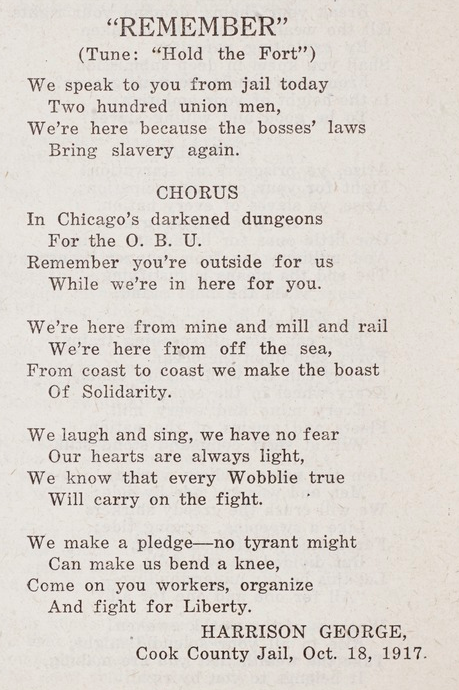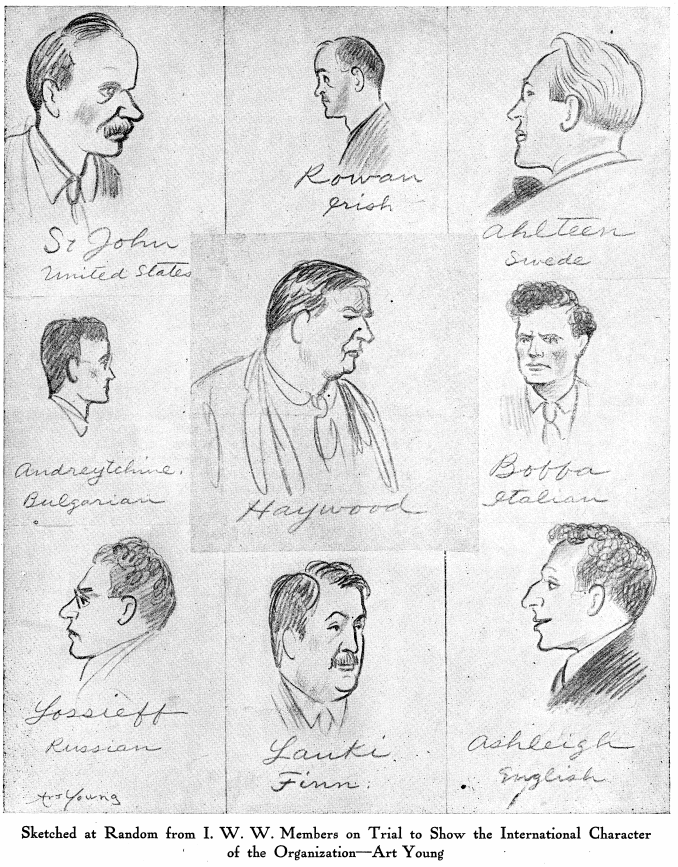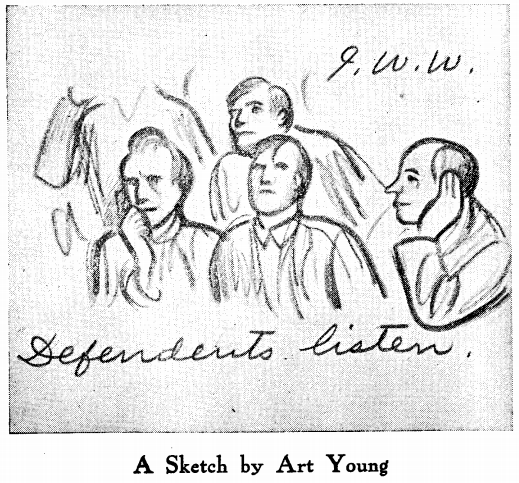Remember, this is the only
American working-class movement which sings.
Tremble then at the I. W. W.,
for a singing movement is not to be beaten.
-Jack Reed
~~~~~~~~~~~~~~~~~~~~~~~~~~~~~~~~~~~~~~~~~~~~~
Hellraisers Journal, Tuesday September 3, 1918
Chicago, Illinois – “Big Bill Haywood, with his black Stetson…”
From The Liberator of September 1918:
Part II of John Reed’s coverage of Chicago I. W. W. trial with drawings by Art Young-
The Social Revolution In Court
By Art Young And John Reed
—–In the early morning they come over from Cook County Jail, where most of them have been rotting three-quarters of a year, and march into the court-room two by two, between police and detectives, bailiffs snarling at the spectators who stand too close. It used to be that they were marched four times a day through the streets of Chicago, hand-cuffed; but the daily circus parade has been done away with.
Now they file in, the ninety-odd who are still in jail, greeting their friends as they pass; and there they are joined by the others, those who are out on bail. The bail is so high-from $25,000 apiece down-that only a few can be let free. The rest have been in that horrible jail-Cook County-since early last fall; almost a year in prison for a hundred men who love freedom more than most.
On the front page of the Daily Defense Bulletin, issued by headquarters, is a drawing of a worker behind the bars, and underneath, “REMEMBER! We are in HERE for YOU; You are out THERE for US! ”
There goes Big Bill Haywood, with his black Stetson above a face like a scarred mountain; Ralph Chaplin, looking like Jack London in his youth; Reddy Doran, of kindly pugnacious countenance, and mop of bright red hair falling over the green eye-shade he always wears; Harrison George, whose forehead is lined with hard thinking; Sam Scarlett, who might have been a yeoman at Crecy; George Andreytchine, his eyes full of Slav storm; Charley Ashleigh, fastidious, sophisticated, with the expression of a well-bred Puck; Grover Perry, young, stony-faced after the manner of the West; Jim Thompson, John Foss, J. A. MacDonald; Boose, Prancner, Rothfisher, Johanson, Lossiev….
Inside the rail of the court-room, crowded together, many in their shirt-sleeves, some reading papers, one or two stretched out asleep, some sitting, some standing up; the faces of workers and fighters, for the most part, also the faces of orators, of poets, the sensitive and passionate faces of foreigners-but all strong faces, all faces of men inspired, somehow; many scarred, few bitter. There could not be gathered together in America one hundred and one men more fit to stand for the Social Revolution. People going into that court-room say, “It’s more like a convention than a trial!” True, and that is one of the things that gives the trial its dignity; that, and the fact that Judge Landis conducts it in a cosmic way….
To me, fresh from Russia, the scene was strangely familiar. For a long time I was puzzled at the feeling of having witnessed it all before; suddenly it flashed upon me.
The I. W. W. trial in the Federal court-room of Chicago looked like a meeting of the Central Executive Committee of the All-Russian Soviets of Workers’ Deputies in Petrograd! I could not get it into my head that these men were on trial. They were not at all cringing, or frightened, but confident, interested, humanly understanding…like the Bolshevik Revolutionary Tribunal….For a moment it seemed to me that I was watching the Central Committee of the American Soviets trying Judge Landis for-well, say counter-revolution. The great enclosure of the court-room assumed the character of delegates’ seats; the high bench was the bar, or docket, whose one occupant, Judge Landis, was typical of the old regime-the best of the old régime….
And then I noticed the clumps of heavy, brutish-faced men, built like minotaurs, whose hips bulged, and whose little eyes looked mingled ferocity and servility, like a bulldog’s; the look of private detectives, and scabs, and other body-guards of private property….
—–And I saw the government prosecutor rise to speak-Attorney Nebeker, legal defender for the great copper-mining corporations; a slim, nattily-dressed man with a face all subtle from twisting and turning in the law, and eyes as cold and undependable as flawed steel…
And I looked through the great windows and saw, in the windows of the office-buildings that ringed us round, the lawyers, the agents, the brokers at their desks, weaving the fabric of this civilization of ours, which drives men to revolt and dream, and then crushes them. From the street came roaring up the ceaseless thunder of Chicago, and a military band went blaring down invisible ways to war.
Talk to us of war! These hundred and one are veterans of a war that has gone on all their lives, in blood, in savage and shocking battle and surprise; a war against a force which has limitless power, gives no quarter, and obeys none of the rules of civilized warfare. The Class Struggle, the age-old guerilla fight of the workers against the masters, world-wide, endless…but destined to end!
These hundred and one have been at it since in their youth they watched their kind being coldly butchered, not knowing how to resist. They have mastered the secret of war-take the offensive! And for that knowledge they are hunted over the earth like rats.
In Lawrence a policeman killed a woman with a gun, a militia-man bayoneted a boy; in Paterson the private-detective-thugs shot and killed a worker standing on his own porch, with his baby in his arms; on the Mesaba Range armed guards of the Steel Trust murdered strikers openly, and other strikers were jailed for it; in San Diego men who tried to speak on the streets were taken from the city by prominent citizens, branded with hot irons, their ribs caved in with base-ball bats; in the harvest fields of the great Northwest workers were searched, and if red cards were found on them, cruelly punished by vigilantes. At Everett, the hirelings of the Lumber Trust massacred them….
The creed of the I. W. W. took hold mostly among migratory workers, otherwise unorganized; among the wretchedly exploited, the agricultural workers, timber-workers, miners, who are viciously underpaid and over-worked, who have no vote, and are protected by no union and no law, whose wage and changing abode never allow them to marry, nor to have a home. The migratory workers never have enough money for railway fares; they must ride the rods, or the” side-door Pullman”; fought not only by Chambers of Commerce, Manufacturers’ Associations, and all the institutions of the law, but also by the “aristocratic” labor unionists. The natural prey of the world of vested interest; of this stuff the I. W. W. is building its kingdom. Good stuff, because tried and refined; without encumbrances; willing to fight and able to take care of itself; chivalrous, adventurous. Let there be a “free speech fight” on in some town, and the “wobblies” converge upon it, across a thousand miles, and fill the jails with champions.
And singing. Remember, this is the only American working-class movement which sings. Tremble then at the I. W. W., for a singing movement is not to be beaten….
When you hear out of a freight train rattling across a black-earth village street somewhere in Iowa, a burst of raucous, ironical young voices singing:
“O I like my boss,
He’s a good friend of mine,
And that’s why I’m starving
Out on the picket-line!
Hallelujah! I’m a bum!
Hallelujah! Bum again!
Hallelujah! Give us a hand-out
To revive us again!”When at hot noon-time along the Philadelphia water-front you hear a bunch of giants resting after their lunch, in the most mournful barber-shop rendering that classic:
“Whadda Ye Want Ta Break Yer Back Fer the Boss For?”
Or,
“Casey Jones-The Union Scab.”
I can hear them now:
“Casey Jones kept his junk pile running,
Casey Jones was working double time;
Casey Jones, he got a wooden medal
For being good and faithful on the S. P. line!”When you hear these songs you’ll know it is the American Social Revolution you are listening to.
They love and revere their singers, too, in the I. W. W. All over the country workers are singing Joe Hill’s songs, “The Rebel Girl,” “Don’t Take My Papa Away From Me,” “Workers of the World, Awaken.” Thousands can repeat his” Last Will,” the three simple versus written in his cell the night before execution. I have met men carrying next their hearts, in the pocket of their working-clothes, little bottles with some of Joe Hill’s ashes in them. Over Bill Haywood’s desk in National headquarters is a painted portrait of Joe Hill, very moving, done with love…. I know no other group of Americans which honors its singers.
Not only popular singers, but also painters, musicians, sculptors, poets. This for example by Charles Ashleigh:
“TO BEAUTY
“Your name, they say, is pale and old,
And speaking of you leaves men cold.
New things, they say, have filled your place;
New thoughts and words, across the space
Of swaying time, have marched and sat
In the high place we worshipped at.
But still for me your name can sing
A hymn that blots my cavilling,
An ecstasy that rocks my heart
And tears the squalid veil apart.
So long as I can feel your reign
And sense your holiness again,
I’ll throw my youth into your hands
And bear your glory through the lands.”Wherever, in the West, there is an I. W. W. local, you will find an intellectual center-a place where men read philosophy, economics, the latest plays, novels; where art and poetry are discussed, and international politics. In my native place, Portland, Oregon, the I. W. W. hall was the livest intellectual center in town…. There are play-wrights in the I. W. W. who write about life in the “jungles,” and the “wobblies” produce the plays for audiences of “wobblies.”…
[Part II of IV, to be continued.]
~~~~~~~~~~~~~~~~~~~~~~
SOURCE & IMAGES
The Liberator
(New York, New York)
https://www.marxists.org/history/usa/culture/pubs/liberator/
-September 1918
John Reed on Chicago IWW Trial
-with Drawings by Art Young, page 20
https://www.marxists.org/history/usa/culture/pubs/liberator/1918/07/v1n07-sep-1918-liberator.pdf
See also:
The Truth about the IWW
Facts in Relation to the Trial at Chicago
National Civil Liberties Bureau, 1918
https://books.google.com/books?id=G1I2AQAAMAAJ
Evidence and cross-examination of J.T. (Red) Doran
in the case of the U.S.A. vs. Wm. D. Haywood et al.
IWW GDC, 1918
https://catalog.hathitrust.org/Record/100663081
Haywood at Chicago IWW Trial
Evidence and cross examination of William D. Haywood
in the case of the U.S.A. vs. Wm. D. Haywood, et al.
Chicago, General Defense Committee, 1918
https://catalog.hathitrust.org/Record/003309919
The I.W.W. Trial
Story of the Greatest Trial in Labor’s History
by one of the Defendants
-by Harrison George
—-with introduction by A. S. Embree.
IWW, Chicago, 1919
https://catalog.hathitrust.org/Record/100663067
~~~~~~~~~~~~~~~~~~~~~~~~~~~~~~~~~~~~~~~~~~~~~
“Remember” by Harrison George
https://digital.wolfsonian.org/WOLF045327/00001/7j



